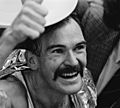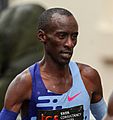Marathon world record progression facts for kids
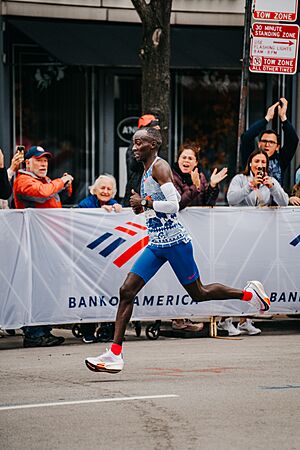
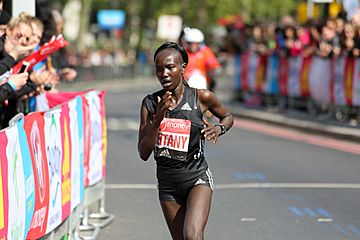
A marathon is a very long running race, about 42 kilometers (26 miles) long. Runners from all over the world try to set new world records in this challenging event. These records are officially approved by World Athletics, which is the main group for track and field sports globally.
Recently, amazing new records have been set. A Kenyan runner named Kelvin Kiptum set a men's world record. He finished the 2023 Chicago Marathon in an incredible 2 hours, 0 minutes, and 35 seconds on October 8, 2023.
For women, another Kenyan athlete, Ruth Chepngetich, set a new world record. She ran the 2024 Chicago Marathon in 2 hours, 9 minutes, and 56 seconds on October 13, 2024. This record was set in a "mixed-sex" race, meaning both men and women were running together.
World Athletics also keeps a separate record for women's races where only women compete. This is called the "Women Only" category. The current record for this category is 2 hours, 16 minutes, and 16 seconds. It was set by Peres Jepchirchir on April 21, 2024, at the London Marathon.
Contents
The Marathon's Journey Through Time
Marathon races first started in 1896. But for many years, the exact distance of a marathon was not always the same. It wasn't until 1921 that World Athletics (then called the IAAF) decided on the official distance: 42.195 kilometers (26 miles 385 yards).
Before 1921, races were often shorter. For example, the first Olympic marathon in 1896 was about 40 kilometers. A Greek runner named Spiridon Louis won it in 2 hours, 58 minutes, and 50 seconds.
The first marathon run over the official distance was at the 1908 Summer Olympics. An American runner, Johnny Hayes, won it in 2 hours, 55 minutes, and 18.4 seconds.
For women, it's believed that Stamata Revithi might have been the first to run the 1896 Olympic course. She ran it the day after the men's race. World Athletics officially recognizes Violet Piercy's run in 1926 as the first woman to complete the standard marathon distance.
Sometimes, a runner's amazing time might not count as a world record. This can happen if the course is found to be too short. For example, in 1981, Alberto Salazar and Allison Roe ran very fast times at the New York City Marathon. But later, the course was found to be 151 meters too short, so their records were not approved.
Another example is the 2011 Boston Marathon. Geoffrey Mutai ran an incredibly fast time of 2:03:02. However, the Boston course has a big downhill section and goes from one point to another. Because of these rules, the time could not be an official world record.
Many world records have been set at famous marathons around the world. These include the Berlin Marathon, Chicago Marathon, and London Marathon.
Rules for Setting a World Record
For a marathon time to be a world record, the course must follow strict rules. These rules are set by World Athletics.
- The course must be exactly 42.195 kilometers (26.2 miles) long. Special tools, like a "calibrated bicycle," are used to measure it very carefully.
- The start and finish points of the race cannot be too far apart. They must be within 50% of the total race distance. This prevents courses that are mostly downhill.
- The course cannot drop too much in height from start to finish. The drop can't be more than 1 meter for every 1,000 meters of running. This also helps prevent very fast times from downhill courses.
These rules make sure that all world records are set on fair and challenging courses.
Women's Marathon Records: A Closer Look
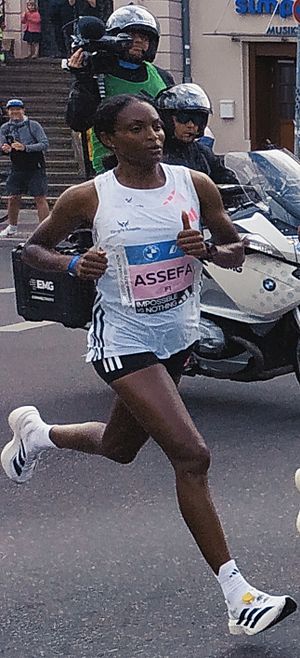
In 2011, World Athletics changed a rule for women's marathon records. They decided that a women's world record must be set in a race where only women are competing.
However, the rules changed again in 2021. Now, World Athletics tracks two types of women's world records:
- Mixed-sex races: Where men and women run together.
- Women-only races: Where only women compete.
Unofficial Record Attempts: Breaking Barriers
Sometimes, runners try to break records in special events that don't follow all the official rules. These attempts are amazing, but they don't count as official world records.
For example, in 2017, Nike organized an event called "Breaking2." Three top runners tried to run a marathon in under two hours. Eliud Kipchoge ran it in 2 hours, 0 minutes, and 25 seconds. This was super fast, but it wasn't an official record. The event had special conditions, like pace cars and rotating teams of pacers.
Kipchoge tried again in 2019 in Vienna, in an event called the "Ineos 1:59 Challenge." He successfully ran the marathon distance in 1 hour, 59 minutes, and 40.2 seconds! He was the first person ever to run a marathon in under two hours. But again, this wasn't an official world record because of the special setup. It was more like a scientific experiment to see what was possible. Guinness World Records recognized it as the "Fastest marathon distance (male)."
Men's Marathon World Records
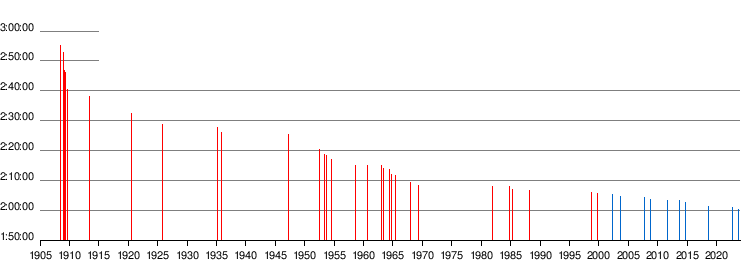
Table key:
Listed by World Athletics as a world best prior to official acceptance
Ratified by World Athletics as a world best (since January 1, 2003) or world record (since January 1, 2004)
Recognized by the Association of Road Racing Statisticians (ARRS)
This table shows the progression of men's marathon world records over time. Some records were considered "world bests" before official recognition.
| Time | Name | Nationality | Date | Event/Place | Source | Notes |
|---|---|---|---|---|---|---|
| 2:55:18.4 | Johnny Hayes | July 24, 1908 | London Olympics, England | IAAF | ||
| 2:52:45.4 | Robert Fowler | January 1, 1909 | Yonkers, United States | IAAF | ||
| 2:46:52.8 | James Clark | February 12, 1909 | New York City, United States | IAAF | ||
| 2:46:04.6 | Albert Raines | May 8, 1909 | New York City, United States | IAAF | ||
| 2:42:31.0 | Henry Barrett | May 8, 1909 | Polytechnic Marathon, London, England | IAAF | ||
| 2:40:34.2 | Thure Johansson | August 31, 1909 | Stockholm, Sweden | IAAF | ||
| 2:38:16.2 | Harry Green | May 12, 1913 | Polytechnic Marathon | IAAF | ||
| 2:36:06.6 | Alexis Ahlgren | May 31, 1913 | Polytechnic Marathon | IAAF | ||
| 2:38:00.8 | Umberto Blasi | November 29, 1914 | Legnano, Italy | ARRS | ||
| 2:32:35.8 | Hannes Kolehmainen | August 22, 1920 | Antwerp Olympics, Belgium | IAAF, ARRS | ||
| 2:29:01.8 | Albert Michelsen | October 12, 1925 | Port Chester Marathon, United States | IAAF | ||
| 2:30:57.6 | Harry Payne | July 5, 1929 | AAA Championships, London, England | ARRS | ||
| 2:26:14 | Sohn Kee-chung | Japanese Korea | March 21, 1935 | Tokyo, Japan | ARRS | |
| 2:27:49.0 | Fusashige Suzuki | March 31, 1935 | Tokyo, Japan | IAAF | ||
| 2:26:44.0 | Yasuo Ikenaka | April 3, 1935 | Tokyo, Japan | IAAF | ||
| 2:26:42 | Sohn Kee-chung | Japanese Korea | November 3, 1935 | Meiji Shrine Games, Tokyo, Japan | IAAF | |
| 2:25:39 | Suh Yun-bok | April 19, 1947 | Boston Marathon | IAAF | ||
| 2:20:42.2 | Jim Peters | June 14, 1952 | Polytechnic Marathon | IAAF, ARRS | ||
| 2:18:40.4 | Jim Peters | June 13, 1953 | Polytechnic Marathon | IAAF, ARRS | ||
| 2:18:34.8 | Jim Peters | October 4, 1953 | Turku Marathon | IAAF, ARRS | ||
| 2:17:39.4 | Jim Peters | June 26, 1954 | Polytechnic Marathon | IAAF | ||
| 2:18:04.8 | Paavo Kotila | August 12, 1956 | Finnish Athletics Championships, Pieksämäki, Finland | ARRS | ||
| 2:15:17.0 | Sergei Popov | August 24, 1958 | European Athletics Championships, Stockholm, Sweden | IAAF, ARRS | ||
| 2:15:16.2 | Abebe Bikila | September 10, 1960 | Rome Olympics, Italy | IAAF, ARRS | ||
| 2:15:15.8 | Toru Terasawa | February 17, 1963 | Beppu-Ōita Marathon | IAAF, ARRS | ||
| 2:14:28 | Leonard Edelen | June 15, 1963 | Polytechnic Marathon | IAAF | ||
| 2:14:43 | Brian Kilby | July 6, 1963 | Port Talbot, Wales | ARRS | ||
| 2:13:55 | Basil Heatley | June 13, 1964 | Polytechnic Marathon | IAAF | ||
| 2:12:11.2 | Abebe Bikila | October 21, 1964 | Tokyo Olympics, Japan | IAAF, ARRS | ||
| 2:12:00 | Morio Shigematsu | June 12, 1965 | Polytechnic Marathon | IAAF | ||
| 2:09:36.4 | Derek Clayton | December 3, 1967 | Fukuoka Marathon | IAAF, ARRS | ||
| 2:08:33.6 | Derek Clayton | May 30, 1969 | Antwerp, Belgium | IAAF | ||
| 2:09:28.8 | Ron Hill | July 23, 1970 | Edinburgh Commonwealth Games, Scotland | ARRS | ||
| 2:09:12 | Ian Thompson | January 31, 1974 | Christchurch Commonwealth Games, New Zealand | ARRS | ||
| 2:09:05.6 | Shigeru So | February 5, 1978 | Beppu-Ōita Marathon | ARRS | ||
| 2:09:01 | Gerard Nijboer | April 26, 1980 | Amsterdam Marathon | ARRS | ||
| 2:08:18 | Robert De Castella | December 6, 1981 | Fukuoka Marathon | IAAF, ARRS | ||
| 2:08:05 | Steve Jones | October 21, 1984 | Chicago Marathon | IAAF, ARRS | ||
| 2:07:12 | Carlos Lopes | April 20, 1985 | Rotterdam Marathon | IAAF, ARRS | ||
| 2:06:50 | Belayneh Dinsamo | April 17, 1988 | Rotterdam Marathon | IAAF, ARRS | ||
| 2:06:05 | Ronaldo da Costa | September 20, 1998 | Berlin Marathon | IAAF, ARRS | ||
| 2:05:42 | Khalid Khannouchi | October 24, 1999 | Chicago Marathon | IAAF, ARRS | ||
| 2:05:38 | Khalid Khannouchi | April 14, 2002 | London Marathon | IAAF, ARRS | ||
| 2:04:55 | Paul Tergat | September 28, 2003 | Berlin Marathon | IAAF, ARRS | ||
| 2:04:26 | Haile Gebrselassie | September 30, 2007 | Berlin Marathon | IAAF, ARRS | ||
| 2:03:59 | Haile Gebrselassie | September 28, 2008 | Berlin Marathon | IAAF, ARRS | ||
| 2:03:38 | Patrick Makau | September 25, 2011 | Berlin Marathon | IAAF, ARRS | ||
| 2:03:23 | Wilson Kipsang | September 29, 2013 | Berlin Marathon | IAAF ARRS | ||
| 2:02:57 | Dennis Kimetto | September 28, 2014 | Berlin Marathon | IAAF ARRS | ||
| 2:01:39 | Eliud Kipchoge | September 16, 2018 | Berlin Marathon | IAAF | ||
| 2:01:09 | Eliud Kipchoge | September 25, 2022 | Berlin Marathon | World Athletics | ||
| 2:00:35 | Kelvin Kiptum | October 8, 2023 | Chicago Marathon | World Athletics | First man to break 2:01:00 in a record-eligible marathon. |
Women's Marathon World Records
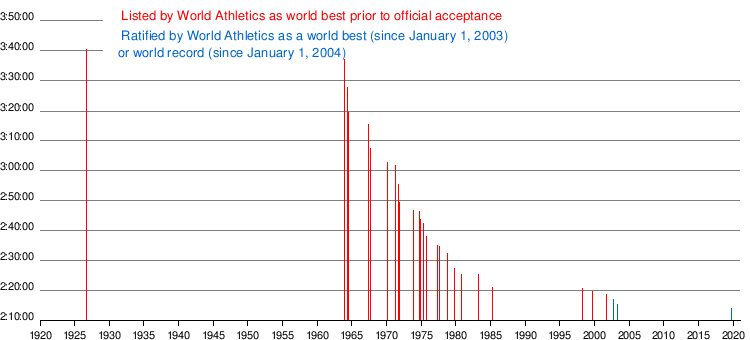
Table key:
Listed by World Athletics as a world best prior to official acceptance
Ratified by World Athletics as a world best (since January 1, 2003) or world record (since January 1, 2004)
Recognized by the Association of Road Racing Statisticians (ARRS)
This table shows the progression of women's marathon world records. Notice how the times have gotten much faster over the years!
| Time | Name | Nationality | Date | Event/Place | Source | Notes |
|---|---|---|---|---|---|---|
| 5:40:xx | Marie-Louise Ledru | September 29, 1918 | Tour de Paris Marathon | ARRS | ||
| 3:40:22 | Violet Piercy | October 3, 1926 | London | IAAF | ||
| 3:37:07 | Merry Lepper | December 16, 1963 | Culver City, United States | IAAF | ||
| 3:27:45 | Dale Greig | May 23, 1964 | Ryde | IAAF, ARRS | ||
| 3:19:33 | Mildred Sampson | July 21, 1964 | Auckland, New Zealand | IAAF | ||
| 3:14:23 | Maureen Wilton | May 6, 1967 | Toronto, Canada | IAAF, ARRS | ||
| 3:07:27.2 | Anni Pede-Erdkamp | September 16, 1967 | Waldniel, West Germany | IAAF, ARRS | ||
| 3:02:53 | Caroline Walker | February 28, 1970 | Seaside, OR | IAAF, ARRS | ||
| 3:01:42 | Elizabeth Bonner | May 9, 1971 | Philadelphia, United States | IAAF, ARRS | ||
| 2:55:22 | Elizabeth Bonner | September 19, 1971 | New York City Marathon | IAAF, ARRS | ||
| 2:49:40 | Cheryl Bridges | December 5, 1971 | Culver City, United States | IAAF, ARRS | ||
| 2:46:36 | Michiko Gorman | December 2, 1973 | Culver City, United States | IAAF, ARRS | ||
| 2:46:24 | Chantal Langlacé | October 27, 1974 | Neuf-Brisach, France | IAAF, ARRS | ||
| 2:43:54.5 | Jacqueline Hansen | December 1, 1974 | Culver City, United States | IAAF, ARRS | ||
| 2:42:24 | Liane Winter | April 21, 1975 | Boston Marathon | IAAF | ||
| 2:40:15.8 | Christa Vahlensieck | May 3, 1975 | Dülmen | IAAF, ARRS | ||
| 2:38:19 | Jacqueline Hansen | October 12, 1975 | Nike OTC Marathon, Eugene, United States | IAAF, ARRS | ||
| 2:35:15.4 | Chantal Langlacé | May 1, 1977 | Oiartzun, Spain | IAAF | ||
| 2:34:47.5 | Christa Vahlensieck | September 10, 1977 | Berlin Marathon | IAAF, ARRS | ||
| 2:32:29.8 | Grete Waitz | October 22, 1978 | New York City Marathon | IAAF | ||
| 2:27:32.6 | Grete Waitz | October 21, 1979 | New York City Marathon | IAAF | ||
| 2:31:23 | Joan Benoit | February 3, 1980 | Auckland, New Zealand | ARRS | ||
| 2:30:57.1 | Patti Catalano | September 6, 1980 | Montreal, Canada | ARRS | ||
| 2:25:41.3 | Grete Waitz | October 26, 1980 | New York City Marathon | IAAF | ||
| 2:30:27 | Joyce Smith | November 16, 1980 | Tokyo, Japan | ARRS | ||
| 2:29:57 | Joyce Smith | March 29, 1981 | London Marathon | ARRS | ||
| 2:25:28 | Allison Roe | October 25, 1981 | New York City Marathon | IAAF | ||
| 2:29:01.6 | Charlotte Teske | January 16, 1982 | Miami, United States | ARRS | ||
| 2:26:12 | Joan Benoit | September 12, 1982 | Nike OTC Marathon, Eugene, United States | ARRS | ||
| 2:25:28.7 | Grete Waitz | April 17, 1983 | London Marathon | IAAF, ARRS | ||
| 2:22:43 | Joan Benoit | April 18, 1983 | Boston Marathon | IAAF | ||
| 2:24:26 | Ingrid Kristiansen | May 13, 1984 | London Marathon | ARRS | ||
| 2:21:06 | Ingrid Kristiansen | April 21, 1985 | London Marathon | IAAF, ARRS | ||
| 2:20:47 | Tegla Loroupe | April 19, 1998 | Rotterdam Marathon | IAAF, ARRS | ||
| 2:20:43 | Tegla Loroupe | September 26, 1999 | Berlin Marathon | IAAF, ARRS | ||
| 2:19:46 | Naoko Takahashi | September 30, 2001 | Berlin Marathon | IAAF, ARRS | ||
| 2:18:47 | Catherine Ndereba | October 7, 2001 | Chicago Marathon | IAAF, ARRS | ||
| 2:17:18 | Paula Radcliffe | October 13, 2002 | Chicago Marathon | IAAF, ARRS | ||
| 2:15:25 Mx | Paula Radcliffe | April 13, 2003 | London Marathon | IAAF, ARRS | ||
| 2:17:42 Wo | Paula Radcliffe | April 17, 2005 | London Marathon | IAAF | ||
| 2:17:01 Wo | Mary Jepkosgei Keitany | April 23, 2017 | London Marathon | IAAF | ||
| 2:14:04 Mx | Brigid Kosgei | October 13, 2019 | Chicago Marathon | IAAF | ||
| 2:11:53 Mx | Tigst Assefa | September 24, 2023 | Berlin Marathon | World Athletics | First woman to break the 2:12:00 barrier in the marathon. | |
| 2:16:16 Wo | Peres Jepchirchir | April 21, 2024 | London Marathon | World Athletics | ||
| 2:09:56 Mx | Ruth Chepng'etich | October 13, 2024 | Chicago Marathon | World Athletics | First woman to break the 2:11:00 and 2:10:00 barriers in the marathon. Awaiting ratification. |
Gallery of World Record Holders
See also
- Marathon year rankings
- National records in the marathon
 | Bayard Rustin |
 | Jeannette Carter |
 | Jeremiah A. Brown |




